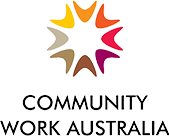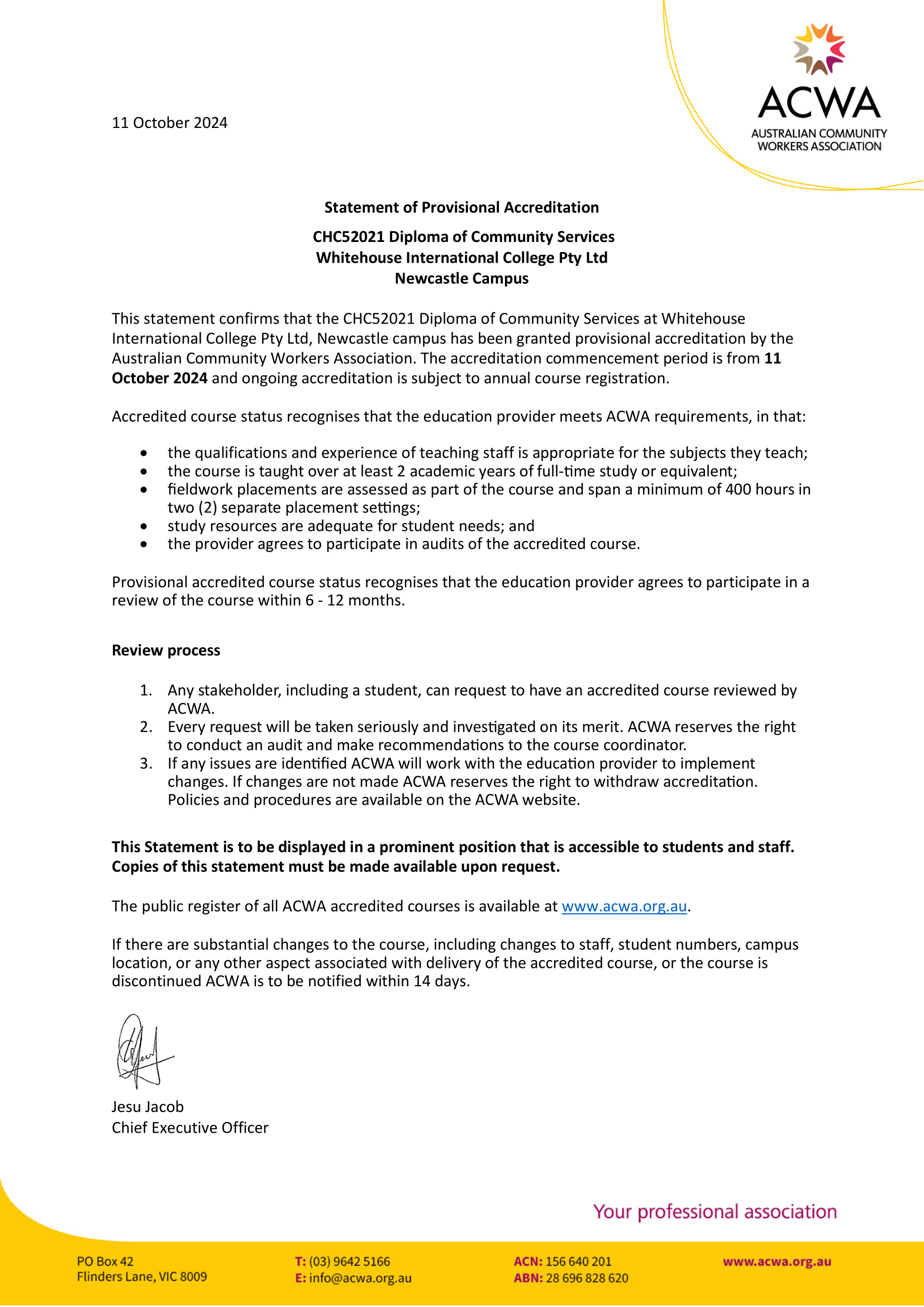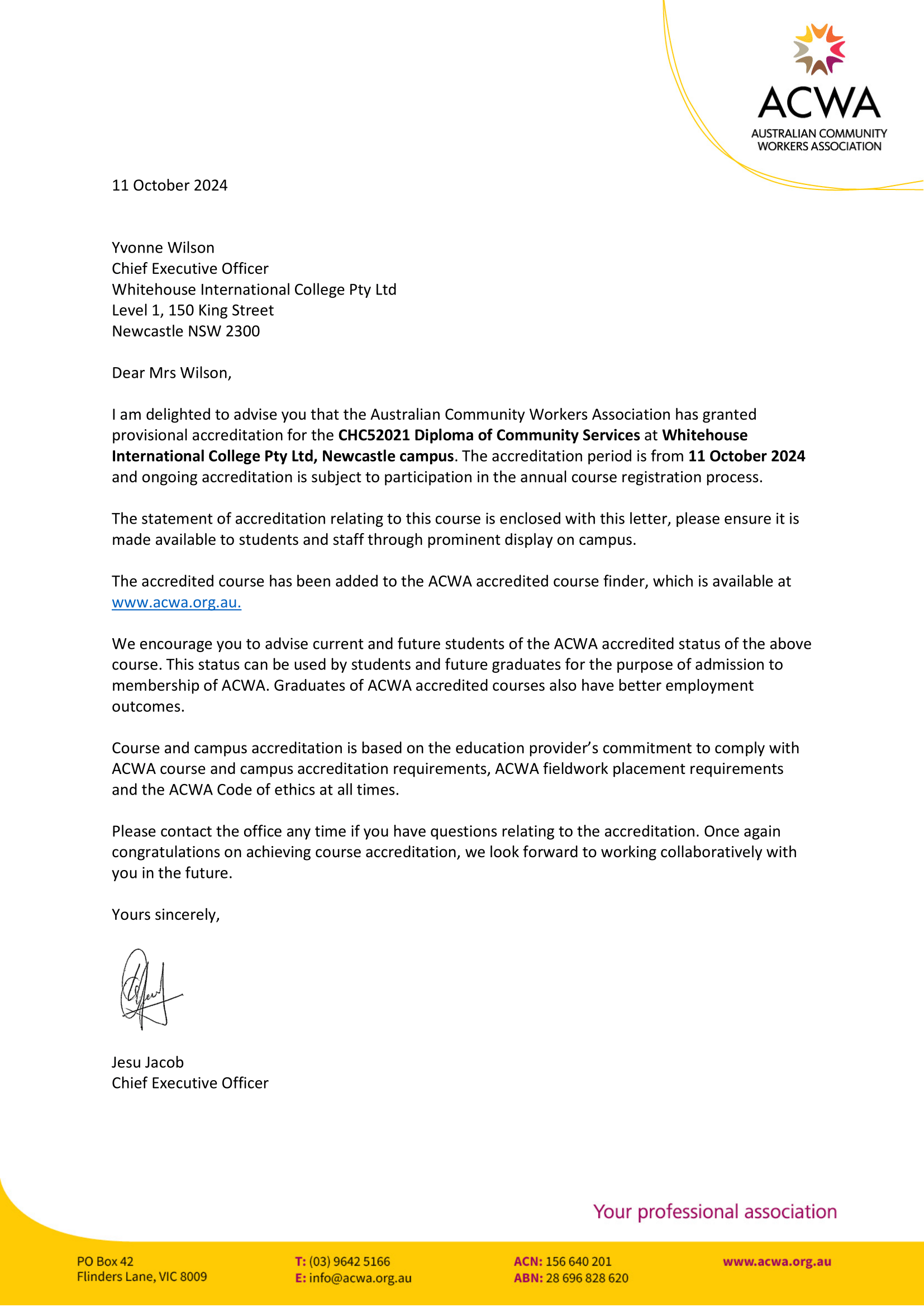

Delivery
Face to Face (On Campus)

Location
Newcastle

Duration
104 weeks

Fees
$27,000

CHC52021 Diploma of Community Services
Provisionally Accredited by Community Work Australia (CWA)
At Whitehouse International College, our CHC52021 Diploma of Community Services is proudly provisionally accredited by Community Work Australia (CWA). This national recognition reflects the high quality and industry relevance of our program—ensuring students are equipped with the practical skills and theoretical knowledge required for today’s dynamic and often complex community services landscape.
A Course Designed for Real Impact
The demand for skilled community workers is growing. Across Australia and around the world, communities are facing urgent social challenges—including rising rates of family and domestic violence, mental health concerns, homelessness, and the far-reaching effects of economic hardship. These issues require knowledgeable, compassionate professionals who can support individuals, families, and entire communities through times of crisis and growth.
This course prepares students to meet those challenges head-on. With a strong foundation in both theory and practice, you’ll develop the core capabilities to work with people across the lifespan and from diverse backgrounds—supporting them to overcome obstacles, build capacity, and live meaningful, connected lives.
What You Will Learn
Our curriculum covers a broad range of essential skills and specialist knowledge areas, including:
Community Development – Strengthen your ability to build inclusive, empowered communities.
Mental Health and Counselling – Understand key mental health issues and apply foundational counselling strategies.
Working with Trauma and Crisis – Learn how to respond confidently and compassionately in high-pressure situations.
Designing and Delivering Programs – Gain experience in developing, facilitating, and evaluating community-based group programs.
Advanced Case Management – Support people with complex needs through structured casework, referrals, and collaboration with other services.
You will also explore ethical practice, professional boundaries, and the importance of cultural awareness, ensuring you graduate as a confident, respectful, and informed practitioner.
Real-World Learning Through Field Placement
To ensure your learning is grounded in real experience, this course includes two supervised field placements, each to an AQF Level 5 standard, and lasting 200 hours—400 hours total across the program.
Across these two diverse environments, you’ll apply your skills directly in professional settings, working with clients and services under the guidance of experienced field supervisors.
Our dedicated Field Placement Coordinator will support you every step of the way, and our strong partnerships with leading community organisations ensure that placements are meaningful, relevant, and aligned with your career goals.
Career Outcomes
Graduates of the CHC52021 Diploma of Community Services are prepared for rewarding roles across a range of fields, including:
Youth work and family support
Homelessness and housing services
Domestic and family violence response
Mental health and wellbeing programs
Disability and aged care services
Community development and outreach projects
You may work as a case manager, support worker, community development officer, or in team leader and coordinator roles—supporting others while making a measurable difference in society.
Whether you’re starting a new career or looking to take your community work skills to the next level, this diploma offers real-world readiness, national recognition, and the opportunity to become a leader in positive social change.
Course Duration:
Spanning an extensive period of 104 weeks, or equivalently two years, this course offers students a comprehensive learning journey. The two-year time frame is meticulously designed to ensure that participants not only grasp the theoretical aspects of the course but also gain ample hands-on experience. This duration paves the way for a progressive, layered understanding of the subject, where each module builds upon the previous, culminating in a deep, holistic grasp by the end of the two years. Throughout this period, students will encounter a blend of interactive sessions, assessments, and real-world application opportunities, enriching their overall learning experience.
Course Fee:
The course comes with a fee structure of Tuition Fee: $26000 and Non Tuition Fee $1000 for a total of $27000 as of 11/10/2024 for the entire two-year duration. This fee encapsulates a host of academic essentials and experiences. It encompasses charges for lectures led by seasoned professionals, meticulously curated course materials tailored to maximize understanding, placement fees to ensure students gain practical exposure in relevant industries, and various other academic-related expenses that enrich the student experience. Prospective enrollees should consider this fee as an investment towards a quality education that’s designed to equip them with both knowledge and industry-relevant skills. Moreover, institutions often provide flexible payment structures, and potential scholarship opportunities might be available, making it easier for students to manage their financial commitments while pursuing their educational aspirations.
If you aspire to a fulfilling career in community services, becoming an ACWA member during your academic journey can significantly streamline your path.
Students currently enrolled in a Diploma of Community Service are eligible and highly encouraged to join ACWA as student members.
At an affordable $20 annually, student membership provides you with invaluable access to resources and professional guidance. These benefits not only facilitate your academic endeavours but also position you strategically to identify roles that align with your unique skills and passions when you’re ready to step into the workforce.
Engaging with established professionals and fellow aspirants can offer clarity on which community work niche resonates with your skill set.
The essence of community work lies in aiding others, and budding professionals like yourself.
Benefits of student membership include:
Updated industry insights, journals, research, and reports via e-newsletters.
Exclusive access to ACWA member-specific resources to enhance your academic achievements.
On-call professional assistance whenever required.
A comprehensive guide on ethical and professional standards.
- A platform to contribute to policymaking.
For more information regarding student membership visit:
https://www.acwa.org.au/students/become-a-student-member/
Payment Terms: 10 Instalment
Refunds Policy (click here)
Mode of Delivery: Face-to-Face (On Campus)
Embracing the traditional and most effective approach to learning, the course is delivered through face-to-face interactions right on the campus premises. This mode of delivery promises numerous advantages:
Direct Interaction with Instructors: Students benefit from real-time feedback and can clarify doubts instantly, ensuring a deeper understanding of the subject matter.
Hands-on Learning: On-campus delivery often allows for practical sessions, workshops, and demonstrations that are hard to replicate in online formats.
Peer Interaction: Learning alongside peers fosters a collaborative environment. Group discussions, debates, and team projects become a vital part of the academic journey, enhancing the comprehension and application of course content.
Campus Facilities: Being on campus gives students access to a plethora of resources such as libraries, labs, study rooms, and other academic facilities that enrich their learning experience.
Structured Learning Environment: A physical classroom setting often provides a disciplined, distraction-free environment, essential for focused learning.
Networking: Face-to-face interactions pave the way for building relationships not only with peers but also with professors and industry professionals, which can be invaluable for future career opportunities.
Cultural and Social Engagement: Being present on campus allows students to partake in extracurricular activities, clubs, and cultural events, providing a holistic educational experience.
In essence, the face-to-face, on-campus mode of delivery ensures that students receive a comprehensive, well-rounded education, combining the strengths of direct instruction with the benefits of collaborative, experiential learning.
Intake Periods:
To offer prospective students flexibility and accommodate varied schedules, the course has multiple intake periods throughout the year. Here’s a breakdown:
FEB/MAR Intake: The first intake of the year, this period is ideal for students who wish to start their academic year early. By choosing this intake, students have the advantage of a fresh start, right at the beginning of the year.
JUN/JUL Intake: This mid-year intake is perfect for those who might have missed the initial intake or those who require a few more months to wrap up prior commitments. Starting in the middle of the year, it also offers a mild break for students transitioning from different academic calendars.
OCT/NOV Intake: Ideal for students who wish to conclude the year by kickstarting their academic journey, this intake can also be beneficial for those who need extra preparation time or are waiting on results from prior studies.
These varied intake periods ensure that students can choose a start time that aligns best with their personal, professional, and academic timelines, making the transition into the course smoother and more tailored to individual needs.
The following are the Admission requirements of college:
- Must be 18 years of age or older.
- A valid IELTS score of 6.0 (with no score below 5.5 in any band), or equivalent. (refer to www.homeaffairs.gov.au/trav/stud/more/student-visa-english-language-requirements)
- Some prospective students may be asked to undertake an LLN assessment or enrolment interview prior to acceptance.
- Must provide proof of school studies which is equivalent to Australian Year 12 or other higher qualifications.
- Physically fit to complete mandatory work placement hours.
It’s essential for prospective students to review and ensure they meet these criteria before applying. These requirements are in place to ensure that every student is well-equipped to thrive and succeed in their chosen course and subsequent career.
Note that other English language tests such as PTE and TOEFL can be accepted. Students are required to provide their results so that it can be confirmed they are equivalent to IELTS 6.0.
- Written questions
- Demonstration of tasks/techniques
- Group activities
- In class activities
- Role play
- Presentation
- Work-based project
- Research projects
- Workplace observations/evidence
To be awarded the CHC52021 Diploma of Community Service, students must demonstrate proficiency by successfully completing every unit outlined within the course’s comprehensive curriculum. This ensures that they have a thorough understanding and capability in all aspects of community service as intended by the course design.
For learners who navigate through a portion of the course but do not complete it in its entirety, a Statement of Attainment will be provided. This statement will specifically list the units where competency has been achieved, acknowledging the efforts and skills gained in those particular areas.
In addition to the academic components, a significant aspect of this diploma is the practical experience component. Hence, the completion of 400 hours of work placement is not just a recommendation but a mandatory requirement. This hands-on experience is designed to immerse students in real-world scenarios, ensuring that they are well-prepared and confident in applying their knowledge and skills in a professional environment. Meeting this requirement is crucial for students to be eligible for the attainment of the CHC52021 Diploma of Community Service.
UNIQUE STUDENT IDENTIFIER (USI) REQUIREMENT
USI is needed for all students studying with Whitehouse International College. From 1 January 2015 for undertaking Nationally Recognised Training delivered by a Registered Training Organisation the students will need to have a Unique Student Identifier (USI). The USI is available online and at no cost to the student. This USI will stay with the student for life and be recorded with any nationally recognised VET course that is completed. Please see the official USI website https://www.usi.gov.au. The student after enrolment is required to create USI (Unique Student Identifier) or allow Whitehouse International College to create an USI on their behalf.
Upon successfully completing the CHC52021 Diploma of Community Service, graduates are equipped with the necessary skills and knowledge to pursue a range of rewarding career paths. Here’s a deeper look into the potential roles and their significance in the community service sector:
Community Development Officer: This role involves working with communities to bring about social change and improve the quality of life in a particular area. They play an integral part in developing strategies and programs to meet community needs.
Community Services Worker: Serving as the backbone of the social service sector, these professionals provide support, resources, and assistance to individuals and groups in need. Their role is crucial in addressing various social challenges and ensuring the well-being of the community.
Case Coordinator/Worker/Manager: These professionals are responsible for organizing and managing a comprehensive plan tailored to individuals requiring services. They act as liaisons between clients and various service providers, ensuring seamless care and support.
Alcohol and Other Drug Support Worker: Specializing in substance abuse, these workers assist individuals battling addiction by providing counselling, resources, and rehabilitation support. Their role is paramount in helping individuals reintegrate into society post-rehabilitation.
Youth Support Worker: Catering specifically to the younger demographic, these workers offer guidance, counselling, and resources to youth facing various challenges. Their support plays a pivotal role in shaping the future of the younger generation.
Program Coordinator/Manager: Responsible for overseeing various community-based projects and initiatives, these individuals ensure that programs are effectively implemented and achieve their intended outcomes. They play a critical role in strategy, planning, and execution.
Welfare Worker: Catering to the broader needs of society, welfare workers assist individuals and families in navigating challenges such as financial hardships, housing issues, and more. Their guidance and support are essential in ensuring individuals receive the right aid at the right time.
Each of these career opportunities not only offers professional growth but also a chance to make a tangible difference in the lives of individuals and communities. The roles are pivotal in ensuring the social fabric remains strong, and communities thrive.
COURSE SUCCESS REQUIREMENTS
For a student to successfully attain the CHC52021 Diploma of Community Service, there are specific prerequisites that need to be met:
Work Placement Hours: A student must complete a minimum of 400 hours of work placement spread across various community service organizations in Australia. Fieldwork placement are neither volunteer nor observational. The structured breakdown of this requirement involves:
A commitment of 200 hours during the first year.
An additional 200 hours during the second year.
WORK PLACEMENT PRE-REQUISITES
Before embarking on their work placements, students must ensure they fulfill the following requirements, which are integral for their safety, the safety of the organizations they work with, and the clientele they serve:
Working with Children Check: A verification process ensuring the student is permitted to engage in activities involving minors.
National Criminal Police Check: A thorough background check is mandatory to ensure that the student doesn’t have any criminal history that might be detrimental to the role they would be playing in community services.
Physical, Mental, and Emotional Fitness: It’s crucial for students to be in a state where they can aptly respond to diverse personal needs they might encounter in their placement. This ensures their well-being and the effective support of those they’re assisting.
First Aid Course Certificate: Being equipped with first aid skills is indispensable in community service roles, ensuring immediate response in emergency scenarios.
Up-to-date Immunisation: This includes, but isn’t limited to, COVID-19 immunization. It safeguards the student and those around them, especially given the diverse environments they’ll be working in.
Meeting these requirements not only ensures the seamless progress of students through the course but also emphasizes the commitment of the institution to the safety and well-being of all parties involved.
Recognition of Prior Learning (RPL) & Credit Transfer (CT) at Whitehouse International College
At Whitehouse International College (WHIC), we value and acknowledge the knowledge and skills you’ve acquired through previous studies, work experiences, and life in general. This recognition can lead to fast-tracking your qualification in the Diploma of Community Services CHC52021 in certain instances.
1. Recognition of Prior Learning (RPL):
RPL is a formal process where your existing skills, whether obtained through professional experience, life encounters, or unaccredited training, are evaluated for the purpose of recognizing them in the academic realm.
Upon your entry and during the interview phase, our WHIC team will guide you on the potential for RPL based on factors such as your cumulative experience, training background, and professional journey.
If you’re a prospective candidate for RPL, WHIC will supply you with a comprehensive kit. This kit will aid you in navigating each module, enabling you to pinpoint skills that align and help you collate necessary evidence.
2. Credit Transfer (CT):
WHIC upholds the recognition of qualifications dispensed by other Registered Training Organisations (RTOs). This implies that subjects or units you’ve previously tackled elsewhere can be credited if they correspond with those in our course.
We engage in a mutual recognition approach for qualifications and Statements of Attainment presented by other RTOs unless they conflict with licensing stipulations.
Unique Student Identifier (USI) Directive
Every student at WHIC needs a USI.
Instituted from 1 January 2015, any student partaking in Nationally Recognised Training by a Registered Training Organisation must possess a Unique Student Identifier (USI). This identifier, which is cost-free and can be procured online, will be a lifelong reference number that keeps a record of all nationally acknowledged Vocational Education Training (VET) that a student undertakes. For more on this, navigate to the official USI portal: https://www.usi.gov.au.
Post-enrolment, students have the prerogative to either personally generate a USI or authorize WHIC to establish a USI on their behalf.
Advancing After the CHC52021 – Diploma of Community Services
Completing the CHC52021 – Diploma of Community Services not only equips you with a specialized set of skills and knowledge but also paves the way for further educational pursuits in the realm of community services and beyond.
Gateway to University Degrees: Many universities recognize the CHC52021 Diploma as a pathway into undergraduate programs. Depending on the institution and the course, you might even receive credit or exemptions for some subjects, allowing you to complete a bachelor’s degree in a reduced time frame.
Specialized Advanced Diplomas: For those wishing to delve deeper into specific areas within community services, there are advanced diplomas that focus on specialized sectors such as child protection, community sector management, or mental health.
Postgraduate Study: If you decide to first transition into an undergraduate program and subsequently complete it, the next step could be a postgraduate course. This could be in the form of postgraduate diplomas, master’s programs, or even research-based doctoral studies. These higher-level courses allow for deeper specialization and are particularly useful for those aiming at leadership or research roles within the community services sector.
Broadened Career Horizons: Beyond formal education, the skills and knowledge gained from the diploma can also be a foundation for further training programs, workshops, and certifications, widening the array of career opportunities and specializations available to you.
Networking Opportunities: Progressing to higher education courses often means exposure to a broader range of professionals and experts in the field. This can be invaluable for networking, mentorship, and collaborative opportunities.
In essence, the CHC52021 – Diploma of Community Services acts as a springboard, not just for advanced roles within the community services sector but also for a plethora of academic and professional opportunities. Whether you’re driven by a desire for deeper knowledge, a broader skill set, or elevated career prospects, higher education courses post-diploma can be the key to fulfilling these aspirations.
Core Units
| Unit Row | Unit Title |
|---|---|
| CHCCCS004 | Assess co-existing needs |
| CHCCCS007 | Develop and implement service programs |
| CHCCCS019 | Recognize and respond to crisis situations |
| CHCCSM013 | Facilitate and review case management |
| CHCDEV005 | Analyse impacts of sociological factors on clients in community work and services |
| CHCDFV001 | Recognize and respond appropriately to domestic and family violence |
| CHCDIV001 | Work with diverse people |
| CHCDIV002 | Promote Aboriginal and/or Torres Strait Islander cultural safety |
| CHCLEG003 | Manage legal and ethical compliance |
| CHCMGT005 | Facilitate workplace debriefing and support processes |
| CHCPRP003 | Reflect on and Improve own professional practice |
| HLTWHS003 | Maintain work health and Safety |
Elective Units
| Unit Row | Unit Title |
|---|---|
| CHCCOM003 | Develop workplace communication strategies |
| CHCMHS001 | Work with people with mental health issues |
| CHCADV002 | Provide advocacy and representation services |
| CHCCSL001 | Establish and confirm the counselling relationship |
| CHCCSL003 | Facilitate the counselling relationship and process |
| CHCGRP002 | Plan and conduct group activities |
| CHCDEV004 | Plan and confirm developmental status |
| CHCCDE027 | Implement community development strategies. |


